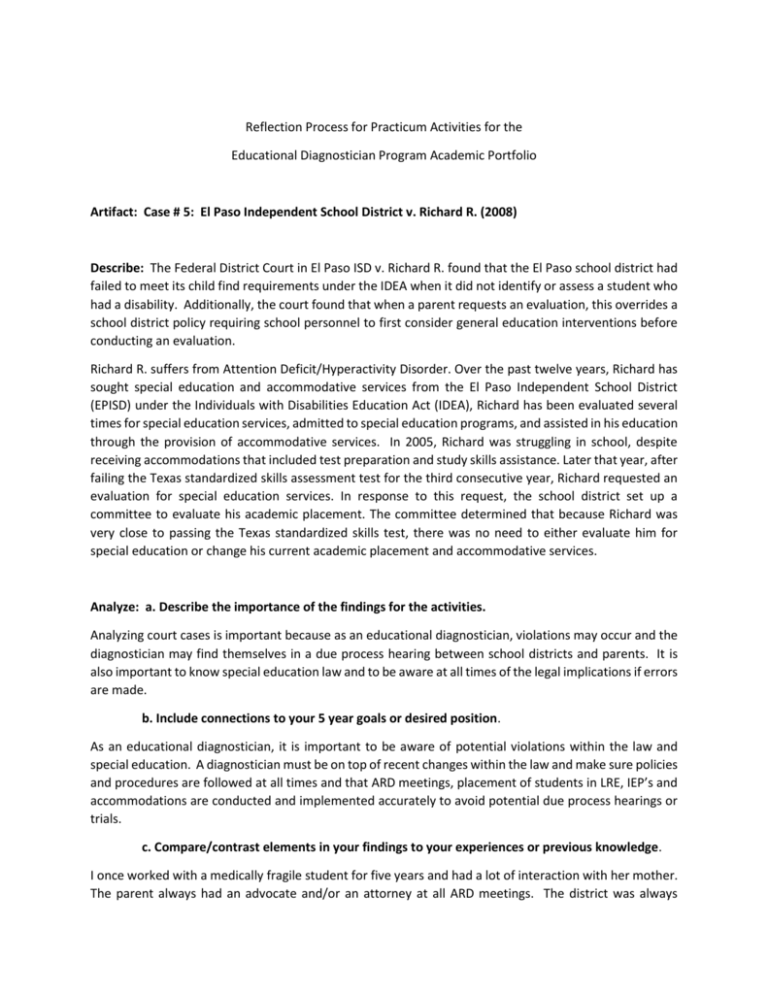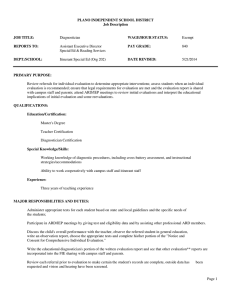File - Educating our Future
advertisement

Reflection Process for Practicum Activities for the Educational Diagnostician Program Academic Portfolio Artifact: Case # 5: El Paso Independent School District v. Richard R. (2008) Describe: The Federal District Court in El Paso ISD v. Richard R. found that the El Paso school district had failed to meet its child find requirements under the IDEA when it did not identify or assess a student who had a disability. Additionally, the court found that when a parent requests an evaluation, this overrides a school district policy requiring school personnel to first consider general education interventions before conducting an evaluation. Richard R. suffers from Attention Deficit/Hyperactivity Disorder. Over the past twelve years, Richard has sought special education and accommodative services from the El Paso Independent School District (EPISD) under the Individuals with Disabilities Education Act (IDEA), Richard has been evaluated several times for special education services, admitted to special education programs, and assisted in his education through the provision of accommodative services. In 2005, Richard was struggling in school, despite receiving accommodations that included test preparation and study skills assistance. Later that year, after failing the Texas standardized skills assessment test for the third consecutive year, Richard requested an evaluation for special education services. In response to this request, the school district set up a committee to evaluate his academic placement. The committee determined that because Richard was very close to passing the Texas standardized skills test, there was no need to either evaluate him for special education or change his current academic placement and accommodative services. Analyze: a. Describe the importance of the findings for the activities. Analyzing court cases is important because as an educational diagnostician, violations may occur and the diagnostician may find themselves in a due process hearing between school districts and parents. It is also important to know special education law and to be aware at all times of the legal implications if errors are made. b. Include connections to your 5 year goals or desired position. As an educational diagnostician, it is important to be aware of potential violations within the law and special education. A diagnostician must be on top of recent changes within the law and make sure policies and procedures are followed at all times and that ARD meetings, placement of students in LRE, IEP’s and accommodations are conducted and implemented accurately to avoid potential due process hearings or trials. c. Compare/contrast elements in your findings to your experiences or previous knowledge. I once worked with a medically fragile student for five years and had a lot of interaction with her mother. The parent always had an advocate and/or an attorney at all ARD meetings. The district was always dealing with a request or complaint the mother had regarding her child’s educational setting. There were many threats of due process hearings and suing the school district and all those involved with the student. As the teacher, I had to make sure all IEP’s were data driven and documented and that she was never selfcontained in a special education classroom. The mother’s main concern was that her daughter be educated with her peers and involved in all school activities. Appraise: Critique or describe whether any of your findings were beneficial to you or not. Each of the court cases studied were interesting, because it made me realize how important following the law is in regard to special education and students with special needs. Anything can happen at any time. Most of the time it is not on purpose and mistakes happen; however, teachers, administrators and diagnosticians must be on top of the law at all times. Transform: a. Describe any future ideas or insights you gained. When I obtain a position as an educational diagnostician, I will make it a priority to always be aware of the law and how it applies to my job and the students I service. This can be achieved by reading publications on special education law and joining a professional organization. b. Describe future plans for use of the ideas presented, including any changes in your current practices or, describe how the information confirmed your current practices and/or beliefs. As mentioned above, I will join a professional organization for diagnosticians, attend conferences and stay abreast of the law as it pertains to the field of special education.











